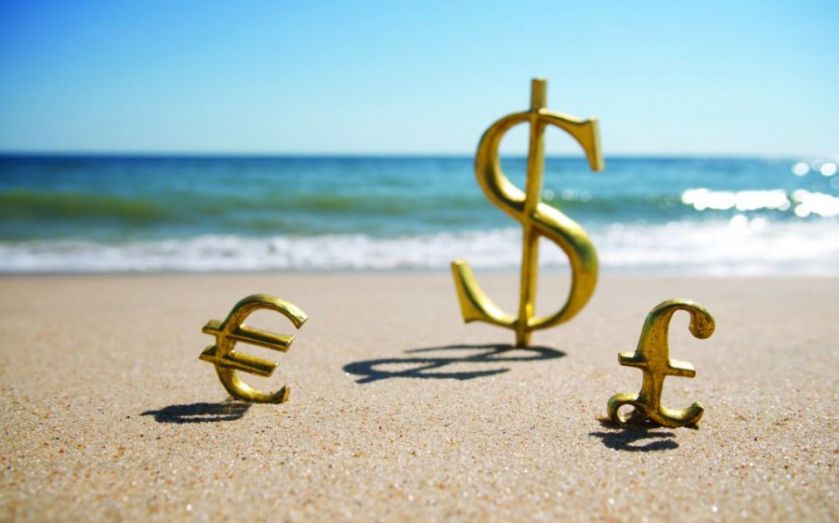Pound strengthens as euro slides: Should holidaymakers stock up now?

With a range of pre-paid cards on the market, there’s no need to hoard currency in your home.
The pound has reached a seven-year high against the euro – and with the Easter break fast approaching, could now be a good time to lock in favourable rates for holiday money?
The euro has been steadily falling in value since last summer, but its decline accelerated this week as the European Central Bank began its quantitative easing programme in a bid to shore up the Eurozone economy.
In March last year, each pound would buy €1.19, but euro weakness means holidaymakers can now expect €1.40 for every pound exchanged.
TROUBLE ABROAD
Sterling has also strengthened against an array of other international currencies in the last two years – including the Russian rouble, the Japanese yen and the Australian dollar.
The pound’s strength is partly down to the UK’s economic recovery leading investors to perceive the currency as a safe haven.
But other factors are at play too. Australian dollars are sensitive to commodity prices, which have fallen significantly in recent months, while economic sanctions and the falling oil price have weakened the rouble. Meanwhile, the Bank of Japan has expanded its aggressive monetary policy aimed at weakening the yen.
Sterling’s renewed strength means holidaymakers ought to take advantage of favourable exchange rates to maximise their increased spending power abroad, says Rupert Lee-Browne, chief executive of foreign exchange provider Caxton FX. “For people going on holiday at Easter… now is a really good time to lock in at least some of your spending money if you are going to the Eurozone.”
Andy Scott, associate director at currency specialists HiFX, outlines the difference in figures: “On a typical seven-night stay in Spain, you will save £150 now versus a year ago,” he says. “We can say with certainty these exchange rates are very favourable.”
TURNING TIDE
But if you are looking to travel in Europe in the summer, will even better rates emerge later in the year? Currency movements are notoriously hard to predict, and while most economists expect the ECB’s quantitative easing to weaken the euro further, the strategy is still considered unconventional and its effects remain uncertain.
Scott argues that the euro’s recent weakness may soon begin to appear out of step with the improving economic outlook across the Eurozone. This may mean the euro begins to strengthen again.
“The bizarre thing about foreign exchange markets is they can get out of kilter with what is going on in the real economy,” he says. “Yes we have quantitative easing and that is an influential force, but the outlook for the Eurozone is starting to improve. The tide seems to be turning.”
CURRENCY CARDS
One way of capitalising on these stellar exchange rates ahead of a holiday – without having to hoard cash at home – is to buy a pre-paid currency card. These are effectively electronic travellers cheques, which allow users to load cash on to a card and then spend it abroad wherever a debit card is accepted.
For example, Caxton FX offers a pre-paid currency card in conjunction with MasterCard, so users can buy currency at today’s prices and lock in the favourable exchange rate.
The key to selecting a pre-paid currency card is comparing the exchange rates offered. Among the most competitively priced are Caxton FX, Ukash and FairFX, according to MoneySavingExpert.
Although pre-paid card companies will not usually levy a fee for loading cash on to the cards or for spending, the exchange rate offered can be up to 10 per cent lower than buying the equivalent amount in cash.
But Caxton FX’s Lee-Browne emphasises that the customer service on offer when things go wrong abroad compensates for the charge. “If you are in Guadeloupe and you run out of money, there is a 24-hour phone line here in the UK able to help.”
ELECTION IMPACT
Although the arguments for buying euros on recent weakness sound compelling, currencies are easily moved by a myriad of forces, as well as seemingly unrelated events.
Sterling may be soaring now, but the UK is facing the most uncertain General Election in a generation – and the outcome could hit currency markets hard. This may make buy and hold investors look foolish.
HOW THE POUND HAS RISEN AGAINST THE WORLD'S MAJOR CURRENCIES
| Currency | Increase | Exchange rate | |
| 1 | Russian rouble | 107% | £1/94 roubles |
| 2 | Australian dollar | 33% | £1/$1.98 |
| 3 | South African rand | 32% | £1/18.60 rand |
| 4 | Japanese yen | 30% | £1/¥182 |
| 5 | Euro | 19% | £1/€1.40 |
| 6 | US dollar | 2% | £1/$1.50 |